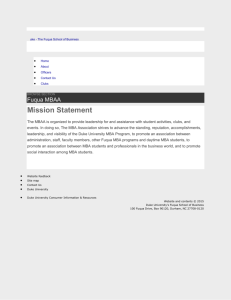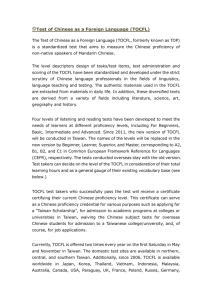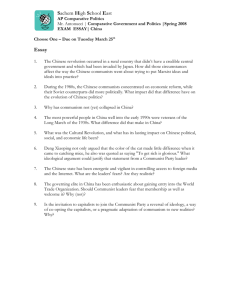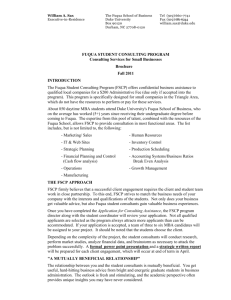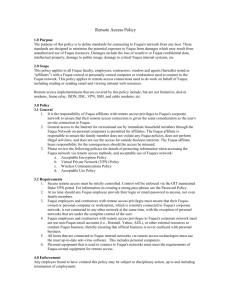MBA (architecture).doc - The-Writing
advertisement
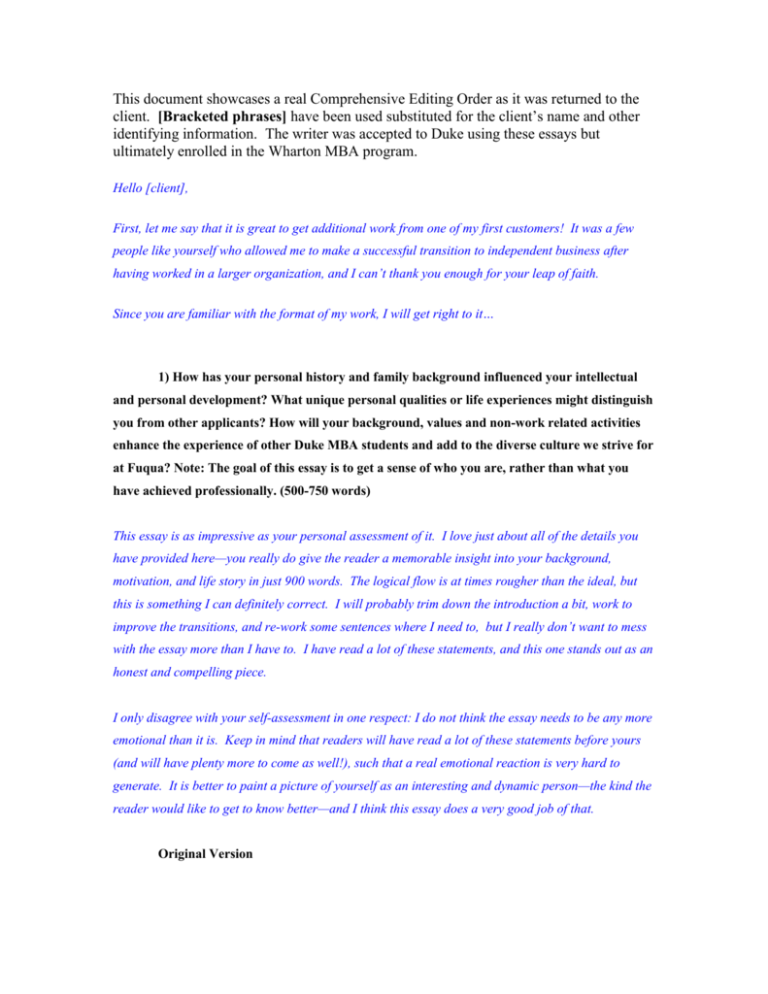
This document showcases a real Comprehensive Editing Order as it was returned to the client. [Bracketed phrases] have been used substituted for the client’s name and other identifying information. The writer was accepted to Duke using these essays but ultimately enrolled in the Wharton MBA program. Hello [client], First, let me say that it is great to get additional work from one of my first customers! It was a few people like yourself who allowed me to make a successful transition to independent business after having worked in a larger organization, and I can’t thank you enough for your leap of faith. Since you are familiar with the format of my work, I will get right to it… 1) How has your personal history and family background influenced your intellectual and personal development? What unique personal qualities or life experiences might distinguish you from other applicants? How will your background, values and non-work related activities enhance the experience of other Duke MBA students and add to the diverse culture we strive for at Fuqua? Note: The goal of this essay is to get a sense of who you are, rather than what you have achieved professionally. (500-750 words) This essay is as impressive as your personal assessment of it. I love just about all of the details you have provided here—you really do give the reader a memorable insight into your background, motivation, and life story in just 900 words. The logical flow is at times rougher than the ideal, but this is something I can definitely correct. I will probably trim down the introduction a bit, work to improve the transitions, and re-work some sentences where I need to, but I really don’t want to mess with the essay more than I have to. I have read a lot of these statements, and this one stands out as an honest and compelling piece. I only disagree with your self-assessment in one respect: I do not think the essay needs to be any more emotional than it is. Keep in mind that readers will have read a lot of these statements before yours (and will have plenty more to come as well!), such that a real emotional reaction is very hard to generate. It is better to paint a picture of yourself as an interesting and dynamic person—the kind the reader would like to get to know better—and I think this essay does a very good job of that. Original Version My grandmother has always loved this old Chinese proverb: “One generation plants the trees, and the next will enjoy the shade”. As cliché as it might sound, this quote captures my family’s selfless spirit for the advancement of their next generations, and such resilient quality has helped shaping me into becoming who I am today. My grandparents first planted the trees for my father in the 1940s, when the Chinese Communists defeated the Nationalists in mainland China. Believing in a democratic government and lifestyle, my grandparents decided to leave their homeland and journeyed along with the retreating National army to Taiwan. They were both illiterate, but highly valued education and worked hard to see my father grew up through an egalitarian learning system. Although my father was raised in poverty, he acknowledged my grandparent’s efforts and worked persistently to become the first college graduate in the family history. My father’s accomplishments didn’t stop there. He graduated from the second best engineering graduate school in Taiwan and was admitted to the very first Taiwanese MBA program. He also became the first person in the family to speak English and traveled to the United States. This international exposure gave my father, who also values education greatly, a daring foresight to give birth to my sister and me in New York so we can later be educated in US. However, they also wanted to ensure that I embraced my Chinese heritage, and decided to stay in Taiwan until my teenage years. Growing up in Taiwan, I was accustomed to the stringent Chinese education system that focused highly on discipline, teamwork and respect. When I moved back to the United States at the age of 13, I first struggled immensely adapting to the independent and free-thinking culture. However, I refused to let this setback prevent me from accomplishing my goals and constantly stepped out of my comfort zones to overcome the language and culture barriers. When I was in high school, for an example, I wanted to take on a prominent role in the percussive section of the school’s symphony. Having never picked up a drum stick before, I worked relentlessly and became Washington State’s highest rated percussionist in my senior year. In another instance, I attempted to overcome my language deficits by taking on an active role with the school Debate club and became the vice president in my junior year. Having now spent exactly half of my life in Asia and the other half in the US, I feel I have taken full advantage of this opportunity and captured the best qualities of the both cultures. I am still accustomed to the discipline and diligent traditions of the Chinese, but also became a much more passionate and expressive that characterizes the American culture. My passion for art, however, remained a constant as I transitioned between the two cultures. Growing up in Taiwan, I was blessed with the natural talents to draw exceptionally well and was inspired to become a painter. My artworks from my childhood were reflective to the Chinese culture – disciplined, detailed and precise. After moving back to the US and encouraged to become much more creative and imaginative, however, I began to realize that my passion is not creating highly crafted artworks, but rather fostering an abstract idea into a concrete form. Having always supported our talents, my father witnessed this passion and encouraged me to embark on a career in architecture – a profession that requires an immense combination of artistic creativity and discipline. As my parents have worked hard to provide me a comfortable shade, I realize the importance of serving others in need, and making a difference through inspirations has resonated very strongly with the values I strive to live by. I have witnessed the poor living conditions of people in Asia and leveraging my architectural knowledge to improve on the community has become very important to me. For an example, I am a very dedicated project designer for the nonprofit organization Habitat for Humanity and have led hundreds of volunteers to constructing 5 housing projects serving the local low-income residents. I have also launched a side start-up design business aimed at creating public art works that could improve the conditions of the community aesthetic and be admired by the general public. Some of our projects include a collage decoration composed of historic photos at the City of Seattle building and a lighting installation at the Seahawks Stadium that stimulated the Northwest constellations. In addition to art and architecture, I also have many other interests, such as traveling, cross country skiing and tennis. Never one to get trapped into routine, I have always thrived on new experiences, but also integrate my diverse interests so that my skills and activities complement each other. I believe my cultural and professional background is truly unique, and my blend of artistic creativity and social background will contribute positively to the classroom. More importantly, however, I believe the generous spirit that my past generations have instilled in me has made me enjoy helping others and I look to actively sharing my personal experiences in the classroom. Accordingly, I know Fuqua is a great fit for me because no other MBA program highlights the social stewardship and the intimate teamwork experience of business education better. I believe the principles of the Fuqua education resonates strong with my personal values, and look to plant the seeds that will one day blossom in the Durham community. Revised Version There is a Chinese proverb that my mother has always loved: “One generation plants the trees; the next enjoys the shade.” My grandparents followed this philosophy and invested in my father, and my parents have in turn invested in me. My life in the proverbial shade has allowed me to develop a diverse set of advanced talents and the sincere motivation to use them to better the lives of the world’s less fortunate. My grandparents were illiterate Chinese peasants in the 1940s, but their belief in democratic government and the importance of free choice led them to follow the retreating Nationalist army as it fled from mainland China to Taiwan. There, although they could not provide my father with much material comfort, they placed a high value on education and encouraged him to pursue a college degree. His diploma was the first in my family, and he later went on to pursue an advanced degree in engineering and even enrolled in Taiwan’s first ever MBA program. He learned English and chose to sacrifice career opportunities to move to New York City so that my sister and I could be born as American citizens. We moved back to Taiwan to live until I was 13 so that we could learn Chinese and maintain a connection with our culture, and the Chinese school system taught us the traditional values of discipline, teamwork, and respect. When I returned to the US, I initially struggled to understand the free-thinking independence exhibited by my fellow students, but I followed my family’s tradition by constantly challenging my comfort zone in order to overcome language and cultural barriers. It was then that I started to discover what had previously been hidden talents. I had always enjoyed art, and my new environment allowed me to transition from the detailed and precise pieces of a talented Taiwanese student to the imaginative expressions of an American artist. Moreover, although I joined the school’s symphony as a percussionist without ever having touched a drumstick, my relentless work ethic allowed me to graduate as the highest-rated percussionist in the state of Washington. Similarly, I joined the Debate with the intention of overcoming my lingering difficulties with English and ascended to the role of Vice President during my junior year. My father suggested that I might best combine my various talents through a career in architecture, and indeed I have grown to love the combination of creativity and restraint that the discipline demands. At this point in my life, I have spent exactly half of my time in Asia and half in the US. I have captured the best aspects of Chinese discipline and tradition and compliment them with the passion and expression that characterizes America. I feel incredibly fortunate to have the material comfort and quality of opportunities that I have enjoyed in my lifetime, but my travels have inspired me to invest in the current generation of underprivileged in addition to the next generation of my family. Thus, I have lead hundreds of casual volunteers on 5 housing projects as a Habitat for Humanity project designer and have launched a side business that creates public art projects—ranging from constellations on the inside of the Seahawks Stadium roof to a collage of historic photos that adorns the City of Seattle building—to improve the urban aesthetic and residents’ frame of mind. My cultural background and professional course are truly unique, and I am confident that they will allow me to make a powerful contribution to any classroom setting. Fuqua’s commitment to social stewardship and intimate teamwork environments makes it the ideal MBA program for me, and the principles of a Fuqua education resonate strongly with my own personal values. I look forward to using what I learn in the Fuqua MBA program to plant seeds for the future in Durham and eventually around the world.

